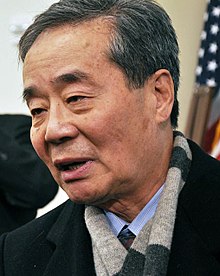Harry Wu
| Harry Wu | |
|---|---|

Wu during a press conference at Washington D.C. in January 2011
|
|
| Born |
吴弘达 February 8, 1937 Shanghai, China |
| Died | April 26, 2016 (aged 79) Honduras |
| Citizenship | United States |
| Harry Wu | |||||||
| Traditional Chinese | 吳弘達 | ||||||
|---|---|---|---|---|---|---|---|
| Simplified Chinese | 吴弘达 | ||||||
|
|||||||
| Transcriptions | |
|---|---|
| Standard Mandarin | |
| Hanyu Pinyin | Wú Hóngdá |
Harry Wu (February 8, 1937 – April 26, 2016; Chinese: 吴弘达) was a Chinese human rights activist. Wu spent 19 years in Chinese labor camps, and he became a resident and citizen of the United States. In 1992, he founded the Laogai Research Foundation.
Wu was born into an affluent family in Shanghai; his father was a banking official and his mother "had descended from a family of well-to-do landlords." Wu recalled:
My youth was one of peace and pleasure. Then in 1949 came the communist revolution, led by Mao. My life changed dramatically. During my teen-age years, my father lost all his properties. We had money problems. The government took over all the property in the country...
Wu studied at the Geology Institute in Beijing, where he earned a degree. In 1956, the Communist Party began a campaign encouraging citizens, particularly students and intellectuals, to express their true views of the Party and the state of society (known as the Hundred Flowers Campaign). Although cautious, Wu eventually voiced some sentiments, by disagreeing with the Soviet Union's armed crackdown in Hungary, and the practice of labeling people into different categories.
By the Fall of 1956, China's leader, Mao Zedong abruptly reversed course and proclaimed that the true enemies of the Party had been exposed and 19-year-old Wu was subsequently singled out at his university. Wu later wrote of this experience: "This was the first time I had ever been singled out as a political troublemaker. Most of my classmates were more pragmatic than I, and they just repeated what the Communists wanted to hear." For the next few years, Wu was continuously criticized in Party meetings and closely monitored until his arrest in 1960 at the age of 23 when he was charged with being a "counterrevolutionary rightist", and was sent to the laogai (China’s system of forced-labor prison camps).
Harry Wu was imprisoned for 19 years in 12 different camps mining coal, building roads, clearing land, and planting and harvesting crops. According to his own accounts, he was beaten, tortured and nearly starved to death, and witnessed the deaths of many other prisoners from brutality, starvation, and suicide.
...
Wikipedia
